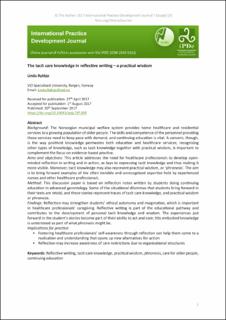| dc.contributor.author | Rykkje, Linda | |
| dc.date.accessioned | 2022-12-16T09:48:12Z | |
| dc.date.available | 2022-12-16T09:48:12Z | |
| dc.date.created | 2017-09-20T19:30:33Z | |
| dc.date.issued | 2017 | |
| dc.identifier.citation | International Practice Development Journal. 2017, 7 (suppl), Article 5, 1-13 | en_US |
| dc.identifier.issn | 2046-9292 | |
| dc.identifier.uri | https://hdl.handle.net/11250/3038209 | |
| dc.description.abstract | Background: The Norwegian municipal welfare system provides home healthcare and residential services to a growing population of older people. The skills and competence of the personnel providing these services need to keep pace with demand, and continuing education is vital. A concern, though, is the way positivist knowledge permeates both education and healthcare services; recognising other types of knowledge, such as tacit knowledge together with practical wisdom, is important to complement the focus on evidence-based practice.
Aims and objectives: This article addresses the need for healthcare professionals to develop openminded reflection in writing and in action, as keys to expressing tacit knowledge and thus making it more visible. Moreover, tacit knowledge may also represent practical wisdom, or ‘phronesis’. The aim is to bring forward examples of the often invisible and unrecognised expertise held by experienced nurses and other healthcare professionals.
Method: This discussion paper is based on reflection notes written by students doing continuing education in advanced gerontology. Some of the situational dilemmas that students bring forward in their texts are retold, and these stories represent traces of tacit care knowledge, and practical wisdom or phronesis.
Findings: Reflection may strengthen students’ ethical autonomy and imagination, which is important in healthcare professionals’ caregiving. Reflective writing is part of the educational pathway and contributes to the development of personal tacit knowledge and wisdom. The experiences put forward in the student’s stories become part of their ability to act and care; this embodied knowledge is understood as part of what phronesis might be. Implications for practice:
• Fostering healthcare professionals’ self-awareness through reflection can help them come to a realisation and understanding that opens up new alternatives for action
• Reflection may increase awareness of care restrictions due to organisational structures | en_US |
| dc.language.iso | eng | en_US |
| dc.publisher | Foundation of Nursing Studies (FoNS) | en_US |
| dc.rights | Navngivelse-Ikkekommersiell 4.0 Internasjonal | * |
| dc.rights.uri | http://creativecommons.org/licenses/by-nc/4.0/deed.no | * |
| dc.subject | continuing education | en_US |
| dc.subject | care for older people | en_US |
| dc.subject | phronesis | en_US |
| dc.subject | practical wisdom | en_US |
| dc.subject | tacit care knowledge | en_US |
| dc.subject | reflective writing | en_US |
| dc.title | The tacit care knowledge in reflective writing – a practical wisdom | en_US |
| dc.type | Peer reviewed | en_US |
| dc.type | Journal article | en_US |
| dc.description.version | publishedVersion | en_US |
| dc.rights.holder | © The Author 2017 International Practice Development Journal, fons.org/library/journal | en_US |
| dc.source.pagenumber | 1-13 | en_US |
| dc.source.volume | 7 | en_US |
| dc.source.journal | International Practice Development Journal | en_US |
| dc.source.issue | (suppl) | en_US |
| dc.identifier.doi | 10.19043/ipdj.7SP.005 | |
| dc.identifier.cristin | 1495982 | |
| dc.source.articlenumber | 5 | en_US |
| cristin.unitcode | 251,3,0,0 | |
| cristin.unitname | Fakultet for helsefag | |
| cristin.ispublished | true | |
| cristin.fulltext | original | |
| cristin.qualitycode | 1 | |

